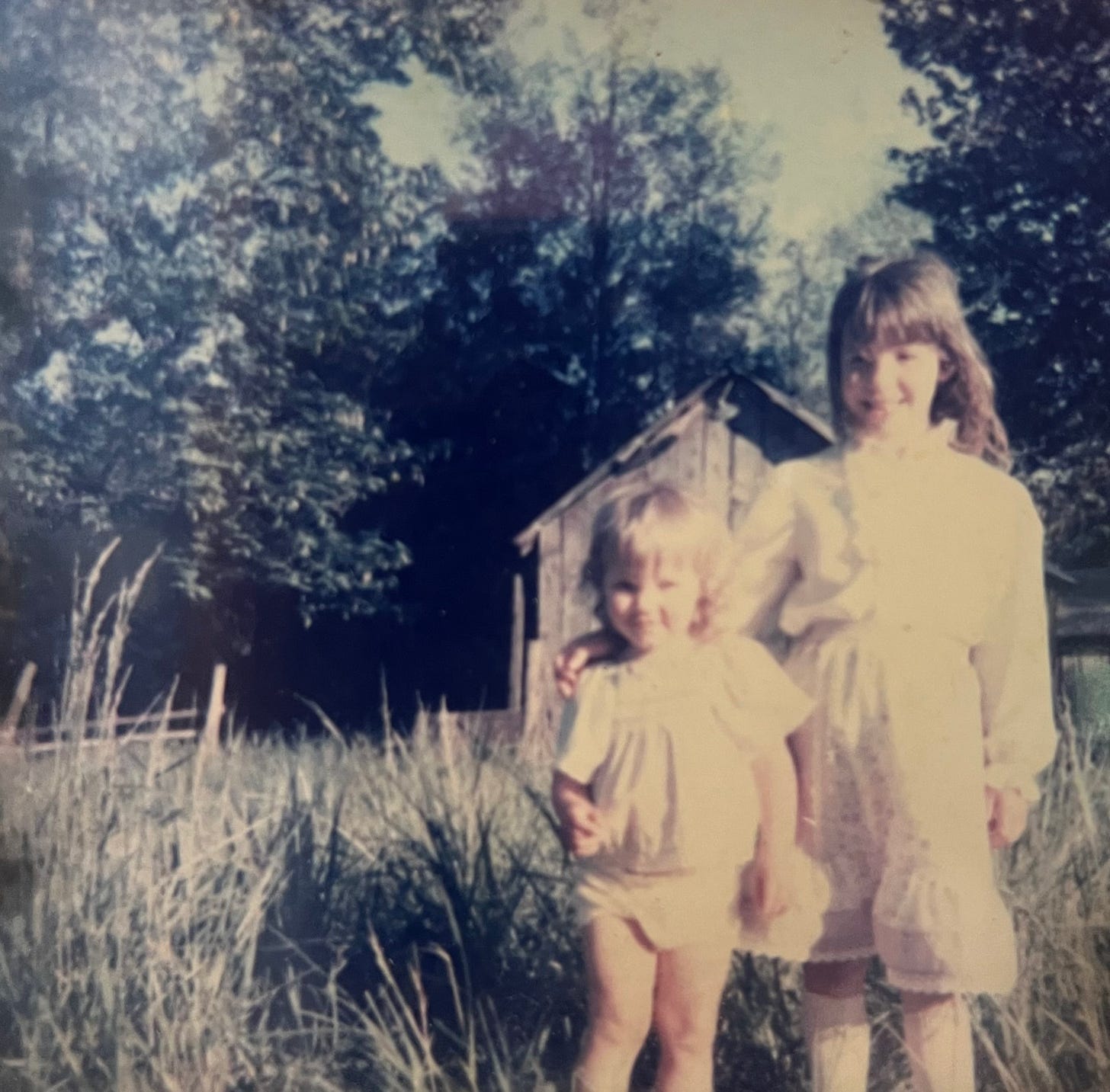hotel in the woods
by Jennifer Cloer
I PASS THE CLEARING every day when I walk my dog. The clearing in the forest lies just on the other side of the fence that separates our ten-acre property from the neighbor’s woods. The dense forest is layered with branches and brush that have accumulated over centuries. Large trees loom over fallen logs, and each time I think: We could make a killer hotel fort in there.
My sister Lisa and I grew up on three acres in rural Oregon, about 100 miles south of where I live now. There was a field with grass that reached our armpits, a creek with slippery banks, and woods that went deep into the mountains behind our house. We picked wild strawberries in the field and made mud pies in the puddles that formed in our driveway each fall.
Lisa and I were five years apart, which sometimes made it feel we came from different planets. She was a squat toddler with blond curls, and I was a grade-schooler with a penchant for telling other kids what to do. We lived twenty miles from town, and we spent long summer days together playing outside, just the two of us. Our lives were simple then, but she already looked to me for clarity and understanding. I was her clearing in the woods.
Our parents were young, still in their 20s. Dad was a brick mason and left early every morning to travel thirty miles to Eugene, the closest big town, to lay rocks in other people’s homes. Our mom kept house. She spent her mornings cleaning and then drinking tea and smoking a joint with her best friend who lived next door. Afterwards, she’d call us in from outside for tuna fish sandwiches and cherry Kool-Aid for lunch. We’d head back out to play some more after wiping the red-stain mustache off our upper lips.
Our favorite game was Hotel, a game I made up. To play Hotel: Walk into the woods, spread out, identify the best hotel rooms that are naturally carved into the trees, ferns, and brush, locate a lobby for check-in, and begin. Naturally, I played the hotel host and assigned the rooms. Neither of us had ever actually stepped inside a hotel room, so it was easy to get creative. Tree branches that had fallen but had been prevented from reaching the ground would make an archway and create an entry to the penthouse suite. Stumps would act as vanity seats we’d sit on and pretend to do our hair before going out on the town. Some rooms might have a special log or a pretty flower bush that made it a premium room requiring additional payment, usually in the form of favors or chores. Once we’d scoped out all the rooms, I would check my sister in and give her the room keys, usually a small set of sticks. We stayed out every night until dark.
The first time I visited Lis in an actual hotel, it wasn’t a hotel at all but a Motel 6. She was thirty years old then and didn’t have a place to live and was working with a social worker at the mental health services center. We’d found it together when she first arrived in the Portland, Oregon, suburb where I lived. After years of drug abuse and bad men, including one especially bad man she was trying to escape at the time, she got herself on the Section 8 housing waiting list and was staying at the Motel 6 until a qualifying home came up.
She’d asked me to bring her twenty dollars, and I wanted to see where she was living. I drove just fifteen minutes from my house and pulled into the motel parking lot where there were no other cars, just a couple bicycles leaning up against the two-story building made from cinder block. Two guys wearing torn clothes with packs on their backs stood smoking cigarettes outside the door labeled with an ‘Office’ sign. A woman emerged from one of the first-floor rooms with a tight dress, heels, and a small clutch under her armpit.
Everything inside me was telling me to leave, to get out of there, but I was determined to see Lis. She had said she was on the second floor, so I parked and walked up the external staircase made out of cement steps and that went up to the right, gripping the metal railing. When I got to the top, I turned left and found motel room number 8 just like she said. I knocked and tried to peek into the window, but the curtains were closed. After a moment, Lis opened the door with a yawn and stepped aside so I could go in. She was wearing the Nirvana T-shirt I bought her for Christmas the year before, and it made me happy that it had survived her latest move.
“Hey, I like your shirt,” I said. She smiled, scratched her hand, and asked me how work was going.
The room was cold and smelled like mildew and spilled beer, and I wished I’d worn my sweatshirt and brought Windex and rags. Two queen beds were draped in ‘70-style comforters. A table with a single chair sat in front of the window where the curtains were drawn. Lisa’s clothes were piled on top of two dressers pushed together and that lined the wall across from the beds. A TV peeked out from the pile. In the back of the room, there was a vanity centered with a cracked mirror. The shower was to the left, the toilet to the right.
“Well, this isn’t bad, Lis. It looks like it has everything you need, and it’s all yours.” My optimism always annoyed her except when she needed it to survive. She either shunned me for it or latched onto my tales of goodness so hard that when they didn’t become reality, she fell even further into despair.
She ignored me and instead turned her attention to the reason I was there. She wanted to know if I’d brought the twenty bucks.
“Yes,” I said, and pulled the folded bill out of my pocket that I’d taken out of the ATM just minutes before and handed it over. Her hands were shaking when she took the bill and pulled it apart. I think she wanted to make sure it was a $20. Maybe she was hoping for more.
“Will you take me to the store? I need cigarettes,” she said.
I had turned towards the single chair at the table. I wanted to sit in her space so that when I was gone and her delusions or hallucinations started up, she would associate this place with someone familiar. When I turned back around to face to her, I could see the dated painting hanging over the TV and dressers was of the forest.
When we ran through the woods as girls, sprinting to lay claim to the best room, we never imagined a hotel or motel room would be like this. Our rooms in the woods were surrounded by beautiful green firs. Birds chirped from the branches that hung over us when we pretended to sit back and watch TV in our makeshift hotel rooms. The air was clean and sometimes smelled like rain. We got to come in from the outside every night and sleep in our real beds where it was warm. Now she was running from a man who made her sleep on the floor and woke her up in the middle of the night screaming about her cheating and then begging her to come back when she’d run out the door to call the cops.
Six months later, Lis was still waiting for Section 8 housing when her OB/GYN told her she needed a hysterectomy, like, stat. I didn’t let her stay with me when she was using, but I suggested it when I learned about the procedure. She refused, even as both her physical and mental health were worsening. Long-term meth use on top of a Schizoaffective diagnosis can result in chronic psychosis that is almost impossible to treat, and she was plagued with fatigue and infections on the regular, often spending long nights with fevers in her motel rooms. She said her caseworker had arranged for a room at the Budget Inn for her recovery. She also said that she had cancer, and that’s why she needed the surgery. My worry deepened, but I didn’t know what was real. I had been living in her world of half-truths and distorted realities for a long time, and her world had become my world, too.
I didn’t get the whole picture until I arrived with Lis for the surgery and met her OB/GYN, who was a female doctor about my age. I instantly liked her. She wore blue scrubs and cap and pulled me aside after the nurses wheeled Lis back for anesthesia.
She told me that Lis had HPV, something she said she saw a lot in the homeless population and especially among women who suffered frequent sexual assault on the streets. She said they had biopsied Lis and she didn’t have cancer—at least they didn’t think so. Once they were into the laparoscopic surgery and could see everything, they would know for sure. She acknowledged that Lis was young for a hysterectomy but said this would prevent the HPV from becoming cancer.
I walked to the lobby to wait and avoided the cracks in the tiled floor. When Lis and I were girls, we played that game, too, the one where you can’t step on a crack or you’ll break your mother’s back. I used the superstition to trick myself into thinking I had some sort of control over this situation. By avoiding the cracks, I hoped that Lis would have a successful surgery, there would be no cancer, and maybe she’d go home with me for at least a night. I sat among strangers in the waiting room while her doctor removed everything. It turned out that my game mostly worked: the surgery was successful, and Lis didn’t have cancer. But she insisted I take her back to her room at the Budget Inn that night.
I returned the next day on my lunch hour to visit her. I’d told her to keep the door open or unlocked so she didn’t have to get up. But she came to the door before I could knock. She was fully dressed and seemed irritable. There was someone else there, too. A guy I’d never met before, who stood in the doorway to the bathroom and looked impatient. Pill bottles prescribed by her OB/GYN littered her bedside table, and clothes were strewn across the floor. Takeout boxes with leftovers took up the entire space on top of the table. Pieces of orange chicken and sweet and sour pork had fallen to the ground. She was supposed to be resting, but she was leaving and told me to help myself to the takeout.
In those days, work was a powerful distraction for me. I traveled a lot, and the hotels where I stayed had marble floors and bell hops who wore white gloves and insisted on carrying my luggage. Some of them even offered a glass of Champagne when I checked in. I never accepted, but I should’ve taken every single glass of free champagne anyone poured for me. On one business trip, I arrived in my room, and a company I was working with had left a basket of fruit, nuts, crackers, cheese, and free booze waiting for me. It felt like such unnecessary abundance, and I remember wondering if I could ship the food home and take it to my sister that weekend.
On another business trip, after I’d premiered a documentary project inside the Saturday Night Live studio at 30 Rock, I called Lis from my hotel room. Sometimes it was easier to call and talk to her, really talk to her, when I was away from home. I’d already pulled off the fancy clothes and tied my curls up in a ponytail, slipped on my soft boxer shorts and tank top and was thinking about the next morning’s flight home before the Thanksgiving weekend. I nestled under the goose down comforter, and half-eaten room service remained on the rolling table they brought in an hour earlier. I wanted to tell her about the chocolates they left on my pillow—truffles—and the view from my room. Even from my bed, I could see Times Square with all its lights and tall buildings.
She asked if the room had a phone in the bathroom like the one in Lake Tahoe, where our grandma took us on vacation as teens. She wanted to know what everybody thought of the film I’d screened, too, but most importantly she wanted every detail about what I wore and how I did my hair.
“Please tell me you didn’t put it up in barrettes, Jen,” she said. I held my iPhone to my ear and stretched my legs out long. The sheets were so soft. I imagined her sitting on her couch in her Section 8 apartment, getting stoned with one of her shows on low volume. Probably Snapped, the one about women who lose it and kill their boyfriends or spouses. It was her favorite.
“No, I left it all down. No barrettes, no rubber bands, nothing.”
“You’re so badass!” she said through a big, long toke off her pipe. I could picture the orange and gray blown glass between her thumb and forefingers.
I asked her about her day, and she told me about the kids in her apartment complex who had been keeping her up at night playing games in the parking lot. I heard her take another big inhale off her pipe, and we laughed together about how city kids would never understand our old game of ‘Hotel.’ Before we hung up, she said, “I bet your room key is gold-plated and not some sticks from the woods.”
The last time Lis and I were in a hotel together, it was just a few months before she died. It was during the pandemic, and she had given up her subsidized housing to live with the barber of an ex. She said they were in love. But then a few days later, she said the barber had murdered people down in Las Vegas and that she didn’t feel safe. I knew she was doing meth and pills, so when she asked if she could stay with my husband and me, I said no and instead suggested I get her a hotel room for a few days. Maybe just take a beat, I said. This was the first of a number of stays I’d arrange for her that summer.
The first time, I picked her and her miniature chihuahua Foxy up from the barber’s house, and we drove about six or seven miles to the Residence Inn. Because of COVID-19 protocols, she and Foxy waited in the car while I went inside to check her in. The lobby was a ghost town, but the floor to ceiling windows were sparkling clean and looked out over a freshly mowed park with curving cement pathways. Plush carpet and blue and tan couches sat in front of the windows with a baby grand that no one was playing. The only people in the building seemed to be the person at the front desk and what looked like a handyman coming around the corner from the hallway. Quiet classical music played overhead, but it wasn’t doing anything to calm my nerves. The news said not to travel. Flights were grounded. Hotels were to be avoided, yet there I was—again.
I went back to the car to get Lis and grabbed her bags. She carried the dog. We walked through the empty lobby together to the elevator on the other side. Once we got in, Lis hit the button for the third floor. The hotel room was a suite the same size as the subsidized housing apartment she’d given up less than a year ago. This was not lost on me when I walked into the kitchenette with modern cupboards and a quartz island that stood between the kitchen and the living room. A large couch and chair faced a wall with a flat-screen TV that hung above a walnut-stained media center. A bedroom and bathroom were walled off to the left. Bottled water and an empty ice bucket sat on the counter in front of us.
“Wow, Jen! Thanks for doing this. It’s perfect. I really need this. It will make me feel safe. I can rest for a few nights.”
She was talking fast, and her eyes were dilated. This time it was me who was the pessimist. I knew she would struggle to be here alone, especially overnight, but I didn’t let my mind go to what she had in mind for her stay. Later, I would learn she had the barber’s family over to party. I thought about staying and sitting with her. But I was scared that she would try to convince me to let her move in with us, and I didn’t know if I could stay strong enough to say no. Her delusions were deepening, and I could no longer keep up with what was real and what wasn’t.
After the pandemic and Lisa’s death, my husband and I moved to the ten acres in the country where the clearing sits beyond our fence. The walks with my dog help me to be present, but my gaze remains on the woods. Bliss—that’s my dog’s name—wants to move on and chase the birds across the hill. But I stand and stare into the forest for a moment longer and imagine Lis there, taking my hand with her palm and asking me which room will be hers in the hotel. It’s the one with the softest bed of needles, I think, the one where she can rest.
I have more time now that I’m not visiting hotel rooms as often. I spend some of it reading about sisters and have learned that sibling relationships are often the longest-lasting relationships in a person’s life. They say that people live longer with a sibling than with a father and that the amount of influence siblings have on each other’s lives is immense and mostly overlooked. As for Lis and me, I hope that somehow I helped her through some of the hardest days. She helped me understand that nothing is black and white, life is both terribly ugly and incredibly beautiful and that a hotel room can be many different things—just like all of us.
About the author:
Jennifer Cloer is working on a memoir about her and her sister that explores the internal conflicts found within all of us when confronted with loved ones who are suffering, how we navigate that world, how it forms us and how it changes us. Her work has been published in Vogue Magazine, and her poetry was included in the Rockaway Writer’s Rendezvous Anthology in 2024. Jennifer earned her BA in Journalism from the University of Oregon and today is an MFA student at Pacific University where she’s studying creative nonfiction. She is the founder and lead advisor at Story Changes Culture Media & Consulting where she edits the company’s award-winning newsletter and curates its Book Club. She is also the creator, writer and director of the Chasing Grace Project, a docuseries about women in the workplace. She is launching a new Narrative Storytelling Masterclass series this fall. You can find her on Instagram, LinkedIn, and BlueSky. Her Substack is The Impermanence of Survival. Jennifer's sister, Lisa Matiaco, passed away five years ago this weekend.










I love the tactile memories of the “hotel rooms.” As a fellow child of the woods, this makes me want to go back to those cozy, earthen spaces.
Wow, Jennifer, you build such a layered sense of place: forests and hotels - make-believe and real ones that take the place of homes - and 2 little girls creating their own world, one of them growing into a world of delusions, and the narrator having to make sense of a world without her sister. This piece is going to stay with me.